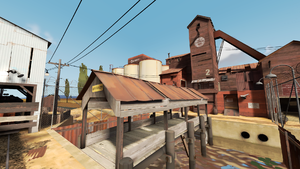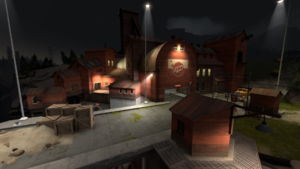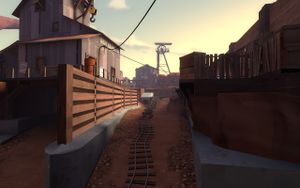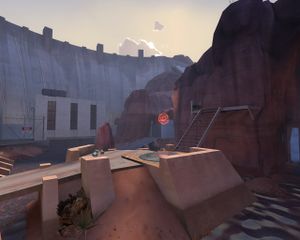Difference between revisions of "List of game modes/cs"
m |
|||
| Line 8: | Line 8: | ||
[[Image:Arenalumberyard.jpg|thumb|right|300px|arena_lumberyard]] | [[Image:Arenalumberyard.jpg|thumb|right|300px|arena_lumberyard]] | ||
{{Quotation|'''Abraham Lincoln''', ''Druhý inaugurační projev, 1865''|I say this to you with the unvarnished factualism of plain talk: I ''love'' Arena Mode.}} | {{Quotation|'''Abraham Lincoln''', ''Druhý inaugurační projev, 1865''|I say this to you with the unvarnished factualism of plain talk: I ''love'' Arena Mode.}} | ||
| − | {{ | + | {{See Also|Tips#Arena|l1=Arena tips}} |
'''Aréna''' mapy jsou vytvořeny tak aby se hra zaměřila úkoly při boji mezi dvěma týmy. Zatímco jiné herní typy se klaní k široké taktice celého týmu. Aréna se zaměřuje na specifické takticky týmu v jednom zápasu. Aréna mapy nesou arena_prefix. | '''Aréna''' mapy jsou vytvořeny tak aby se hra zaměřila úkoly při boji mezi dvěma týmy. Zatímco jiné herní typy se klaní k široké taktice celého týmu. Aréna se zaměřuje na specifické takticky týmu v jednom zápasu. Aréna mapy nesou arena_prefix. | ||
Revision as of 00:30, 5 December 2010
| “Oh dear, I've made quite a mess.” This page has been marked for general cleanup. Reason given: none given Please see Team Fortress Wiki style guide for information on how to improve this article. |
Team Fortress 2 má v současnosti sedm herních typů. Zpočátku měla hra pouze tří herní typy: Capture the Flag, Control Point, a Territorial Control. Početné updates přidaly další čtyři typy: Payload, Arena, King of the Hill, a Payload Race. Tyto herní typy jsou rozloženy na 39ti oficiálních mapách maps a nabízí velkou škálu hracích stylů v Team Fortress 2.
Obsah
Arena
| “ | I say this to you with the unvarnished factualism of plain talk: I love Arena Mode.
— Abraham Lincoln, Druhý inaugurační projev, 1865
|
” |
Aréna mapy jsou vytvořeny tak aby se hra zaměřila úkoly při boji mezi dvěma týmy. Zatímco jiné herní typy se klaní k široké taktice celého týmu. Aréna se zaměřuje na specifické takticky týmu v jednom zápasu. Aréna mapy nesou arena_prefix.
Aréna nabízí menší mapy které se hrají na kratší časový interval. Kolo skončí tehdy nemá-li jeden tým už žádného živého zástupce, nebo je-li centrální kontrolní bod odemčen a zachycen. Tento kontrolní bod se odemkne po uplynulé minutě zápasu. Kola mají tendeci být velice rychlá a vysoce konkurenční, s důrazem na ovládání vaší třídy a plánem na boj s opozitním týmem. Arény jsou vhodně pro menší zápasy s ti vs. tři hráči, ale stále podporuje i obří rvačky dvanáct vs. dvanáct hráčů. Aréna funguje podobně jako Sudden Death - respawn je zakázán a nejsou zde žádné resupply krabice. Je zde obvykle velice málo lékárniček, obvykle umístěny daleko od hlavního boje a/nebo ve velice riskantních místech. Toto tým nutí více spoléhat na Dispenser-y a Medic-y.
Hráči na straně prohrávajícího týmu mohou zůstat a zaručit rovný počet hráčů, nebo umožnit sledujícím hráčům( těm kteří už se nevešli do základní sestavy) vstup do hry . Hráči z výherního týmu nikdy nebudou muset čekat na další kolo.
First Blood kritická podpora je unikátní a pouze v Aréně, a je udělena pro hráče kteří jako první získají frag.
Aréna mapy:
Capture the Flag
| “ | Wave goodbye to ya secret crap, dumbass!
Klikněte pro poslech
— The Scout
|
” |
Zadržení vlajky zahrnuje obě RED i BLU základny, kde každá z nich vlastní svůj Intelligence kufřík (znám jako vlajka). Úkol obou týmu je zadržet nepřítelovu vlajku dokud nesplní zadržovací limit (výchozí nastavení je 3 zadržení)a zároveň zabránit nepříteli v dosažení toho samého.
Inteligence obou týmů bývají schovány hluboko v základnách obou týmů, obvykle symetricky k té druhé, v místnosti zvané 'inteligenční místnost'. K chopení se Inteligence se musí hráč dotknout nepřítelova kufříku. Při nesení nepřítelovy inteligence, musí hráč jej donést do jeho inteligenční místnosti kde musí vstoupit do 'zachycovací zóny' (lemováno žlutými a černými čarami) k úspěšnému zadržení inteligence. Po úspěšném zadržení, je tým obdařen pár sekundami Krit podpory.
Pokud je nositel inteligence zabit nebo jí pustí, kufřík zůstane ležet na zemi po dobu 60 sekund, s časovým ukazatelem kolik času zbývá než se kufřík vrátí do inteligenční místnosti nad inteligencí. Po tuto dobu může být inteligence normálně zvednutá. Pokaždé když kdy inteligence spadne, čas se resetuje. Po tuto dobu nepřítel nemůže s inteligenci nijak pohnout nebo zresetovat čas.¨Inteligence nemůže být nesena hráč pod efektem ÜberCharge nebo Scout-ovým Bonk! Atomic Punch) a hráči nesou inteligenci nemohou obdržet tyto podpory. Nicméně, zvedne-li Spy inteligenci jako převlečený, toto převlečení ztratí a nemůže použít ani převlečení a plášť. V případě že nositel inteligence zemře v nepřístupných částech mapy (t.j. spadne-li do jámy) inteligence se okamžitě vrátí do inteligenční místnosti. Jestliže ani jedem tým nesplní zadržovací limit před časovým limitem, zápas přejde v Sudden death.
Na rozdíl od ostatních variant zadržení vlajky, hráč může úspěšně zadržet vlajku není-li jeho vlastní vlajka v základně.
Capture the Flag mapy:
Control Point
| “ | This point ain't gonna cap itself! Get over here!
Klikněte pro poslech
— The Engineer
|
” |
See also: Control points
Control point maps have two main types of game modes.
Control points are circular platforms with a team-colored light and hologram in the center (neutral points will have a white light and hologram). To capture a point owned by the enemy team, the player simply stands on the point until the capture meter fills with your team color. The more players on a point, the faster it will capture, though only to a limited extent. Scouts and Soldiers or Demomen wielding a Pain Train count as 2 players when capturing points. No capture progress will be made when players of both teams are on the point. If all the capturing players are killed or driven off before the capture is completed, the capture progress will not reset immediately but instead will slowly fade away.
There are three states for a Capture Point:
There are two main types of control point maps – Standard Control Point and Attack/Defend maps:
Standard control point
Standard control point (or Linear Control Point) maps play symmetrically. Both teams start with two controlled points, and a central point starts out neutral. The team that captures all control points wins. Traditional Control Point maps will go into Sudden death (or Stalemate) if no team captures all the points before times runs out. Control points closer to a team's spawn point are captured more quickly by the enemy team.
Standard control point maps:
Attack/Defend
Attack/Defend maps play asymmetrically. RED begins with all the points in their control. BLU wins if it captures all of RED's points. Points may only be captured in a set order (though some maps, such as Gravel Pit and Steel, may make exceptions). RED wins if it prevents BLU from capturing all points before the timer expires. Points captured by BLU are typically locked.
Attack/Defend maps can come in various styles. Some maps such as Dustbowl and Egypt require BLU to capture three stages of two points each to win the game. If the attacking team fails to win any stage, teams will switch and the defenders will then take turn to be the attackers, beginning with stage 1. Other maps such as Gravel Pit and Junction allow the attacker to capture two points in any order (points A or B) before attacking the final point (point C). Steel is a unique Attack/Defend map in that capturing each minor capture point (points A,B,C and D) will allow better accessibility to the main point (point E), such as allowing more routes into point E or extending bridges to the point so that classes other than the Scout, Soldier, Demoman or sentry jumping Engineers can capture it.
Attack/Defend maps:
King of the Hill
| “ | Since their discovery in 1895, hills have fascinated kings.
— The Classless Update
|
” |
King of the Hill is similar to Arena. King of the Hill focuses on a single control point at the center of the map, which is neutral and locked at the beginning of the round. Teams must make their way to the Control Point and capture it when it becomes available. Once the point is captured by a team, their team clock will start a three minute countdown. If the enemy team manages to capture the point back, their clock will start counting down while the other team’s clock freezes at the time the point was recaptured. A team wins once they own the point and their three minutes is expired.
King of the Hill maps:
Payload
| “ | Onward, great bomb-cart!
Klikněte pro poslech
— The Heavy
|
” |
In Payload maps, BLU team must escort a cart full of explosives through a series of checkpoints and into RED's base within a certain amount of time. BLU team members move or 'push' the cart by standing next to it - the more people near the cart, the faster it moves. Any RED team member standing near the cart will stop it from venturing further. If no BLU player pushes the cart for 30 seconds, the cart will start moving backwards slowly until it reaches a checkpoint/BLU spawn or a BLU player stands next to it again. The cart functions as a level 1 Dispenser for BLU team (and disguised enemy Spies) to restore health and ammunition to those pushing it. Ammunition is not restored to players standing at the front of the cart.
Some maps have one-way routes from the BLU side, sometimes closed off until a specific point is taken.
Some maps such as Gold Rush, Hoodoo and Thunder Mountain are split in three stages that BLU must advance through and win. Stages one and two have 2 checkpoints and stage three has 3 checkpoints (2 for Hoodoo), including the final point. Badwater Basin and Upward maps have a single round with 4 checkpoints, including the final point. Advancing the cart to the next checkpoint gives the BLU team extra time. Advancing it to the final point moves the map onto the next stage. When the cart reaches the final point on the final stage, the Payload explodes and destroys RED base, symbolizing BLU's victory.
Payload maps:
Payload Race
Unlike standard Payload maps, Payload race maps feature both RED and BLU issued with a cart, thus teams are not defined to a attacking or defending role. To win, each team must simultaneously push their cart through enemy territory to reach the final point while preventing the enemy team from doing the same. As with Payload mode, team members push the cart by standing next to it, with more members increasing the speed of the cart and opposing team members halting it.
Unlike Payload mode, the cart will not move backwards after any duration of time and there is no time limit; the map will only end when one team successfully pushes their cart to the finish point. Each cart works as a Dispenser for their team (and disguised enemy Spies), restoring health and ammunition to those pushing the cart. Parts of the track may feature slopes, on which the cart will quickly roll back down to the bottom unless it is being constantly pushed.
Payload race maps may or may not be split into multiple rounds.
Payload race maps:
Territorial Control
| “ | We have you surrounded, at least from this side!
Klikněte pro poslech
— The Soldier
|
” |
In Territorial control the goal is to take over the entire map by capturing 'territories'. Each game is randomly selected from the six available layouts in a 'point against point' game where both teams must capture the opposite point while defending their own. After a team successfully captures the opposite point, the next round takes place in a different area of the map which is also randomly selected. After a team captures all four territories, that team must capture the enemy team's base. If the base point is captured (in Hydro, the Radar Dish for RED, The Power plant for BLU), the attacking team wins the game. When the next round begins, territories are reset and a new random layout is selected.
In any game in TC (except in RED/BLU base games), if a point is not captured within the eight minute time clock, the game then will go into Sudden Death mode.
Territorial control maps:
Training Mode
| “ | I make it look easy.
Klikněte pro poslech
— The Sniper
|
” |
Training maps are intended to teach the basics of gameplay and advanced techniques. Training mode shipped with the Mac Update, which introduced two official training maps.
Brandon Reinhart indirectly announced on the Official TF2 Blog on July 28, 2010 that Corey Peters is currently working on another official training map[1], though details are as of yet unknown for which class or what gameplay mechanics it focuses on.
Other modes
Highlander
| “ | There can be only one!
Klikněte pro poslech
— The Demoman
|
” |
Highlander mode restricts the number of players of each team to 9 players and only allows one player per class on each team. It is applicable to any game mode and can be activated by entering mp_highlander 1 into the console.
The idea behind Highlander mode existed previous to its official inclusion in the game, and has been implemented in server mods. Highlander mode was officially added in the February 3, 2010 Patch.
Dueling Mini-Game
A mini-game released in the Mann-Conomy Update. The Dueling Mini-Game is an action item that can be purchased in the Mann-Co store or found in a drop. When loaded into the action slot, the item can be triggered to pit the user against one person on the opposing team, provided they accept the challenge. Until the end of the round, points gained by killing the opponent are tracked until the end of the round, and the player with the most points wins the "duel". Currently, the item itself has a maximum of 5 uses, and can be used successfully on all official maps.
Unreleased
A new game mode was announced in the reveal of the Polycount Pack winners, which was supposed to be released alongside the Packs. However, this new game mode has been delayed with no estimation as to when it will be ready. Robin Walker has stated in an interview[2] that this game mode is to be released with the next major content patch, along with the new surprise Polycount pack. The two will somehow be linked. In a interview for PCGamer[1] Robin stated that: “We’ll probably start talking about that stuff soon once we’ve figured out how to talk about it.”















